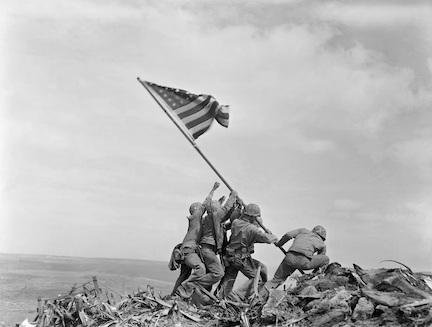
Ernie Pyle And Edward Murrow
Ernie Pyle and Edward R. Murrow are two of the greatest journalists of World War II. I have no idea as to whether they ever met one another – if you know for sure, please let me know. The reporting that each did during the darkest days of the London blitz and throughout the war in Europe had a significant effect on American perception of the war.
For all of their many differences, the two men have quite a bit in common. Both came from small town, working-class backgrounds. Both were thin, shy, bashful men who went to college and fell in love with writing. Ernie Pyle and Edward R. Murrow were superb writers and interviewers. Both men drink too much and smoked far too much. each was great at spinning a yarn but ultimately more interested in listening to other people.
During the blitz of London, Edward R Murrow famously reported from the rooftop of the BBC building. He cut a dashing, romantic figure

Edward R. Murrow In London
as he hobnobbed with the cream of British society. When the Blitz began, Murrow’s agenda was clear. While he was reporting accurately on the Blitz, he was doing all he could to shape public opinion back home. He wanted the USA to come into the war on the side of the British. In hindsight, USA support if Britain seems inevitable. However, there was a strong isolationist movement in America. Murrow’s reporting was crucial to FDR and Churchill. Back home, Americans sat around the radio riveted to Murrow’s description of a city under attack:
” I’m standing on a rooftop, looking out over London. At the moment, everything is quiet. For reasons of national as well as personal security, I am unable to tell you the exact location from which I’m speaking. Off to my left, far away in the distance, I can see just that faint, red, angry snap of anti-aircraft bursts against the steel blue sky.
I was up here earlier this afternoon. And looking out over these housetops, looking all the way to the dome of St. Paul’s, I saw many flags flying from staffs. No one ordered these people to put out the flags, they simply feel like flying the Union Jack above their roof. No one told them to do it, and no flag up there was white. I can see one or two of them just stirring very faintly in the breeze now.”
(You can download and listen to some of Murrow’s broadcasts by clicking here.)
Ernie Pyle was in London during the blitz as well. This part of Pyle’s career is much less remembered than his seminal reporting as an embedded reporter traveling with GI in Italy and France.

Ernie Pyle
His reporting makes a wonderful counterpoint to Murrow’s. Pyle walked the streets of London, talking with people in flower shops and construction workers. As Murrow’s magnificent radio prose painted the big picture from the rooftops, Ernie Pyle offered understated newspaper observations from the street looking up.
“They came just after dark, and somehow I could sense from the quick, bitter firing of the guns that there was to be no monkey business this night.













you might find this interesting-My cousin worked for CBS radio, Washington,DC. She was in charge of lining up interviews w timely & distinguished people , to go on radio. She was a very close friend of Edw.R.Murrow. The night he gave his tv report, exposing McCarthy, Murrow came to her office w a bottle of booze. He told her not to tell anyone he was there. He didnot want to be asked any questions re: his expose’. !
Pingback: An Unknown Hero - Carl von Ossietzky - Speaking For A ChangeSpeaking For A Change
Pingback: The Note In Ike's Pocket - Eisenhower and D-Day - Speaking For A ChangeSpeaking For A Change
Hi!
I love speaking about Ike and will make sure to put that on the agenda!
Barry
Pingback: The Note In Ike's Pocket - Eisenhower and D-Day - Speaking For A ChangeSpeaking For A Change